-

新人教版高中英语必修3Unit 4 Space Exploration-Listening&Speaking&Talking教学设计二
The themes of this part are “Talk about how to become an astronaut” and “Talk about life in space”. As Neil Armstrong said “Mystery creates wonder and wonder is the basis of man’s desire to understand. Space is difficult for human to reach, therefore, humans are full of wonders about it. However, if wanting to achieve the dream of reaching the Moon, some of our human should work hard to be an astronaut at first. Part A(Talk about how to become an astronaut) is a radio interview in a radio studio, where the host asked the Chinese astronauts about his story how to become an astronaut. Yang Liwei told his dreamed to be an astronaut since childhood. Then he worked hard to get into college at 22. The next 10 years, he gradually became an experienced pilot. At the same time, to be an astronaut, he had to study hard English, science and astronomy and trained hard to keep in good physical and mental health and to practise using space equipment. Part B (Talk about life in space) is also an interview with the astronaut Brown, who is back on the earth. The host Max asked about his space life, such as his emotion about going back the earth, the eating, shower, brushing, hobbies and his work. Part A and Part B are interviews. So expressing curiosity about the guests’ past life is a communicative skill, which students should be guided to learn.1. Students can get detailed information about how Yang Liwei became an astronaut and Max’s space life.2. Students learn to proper listening strategy to get detailed information---listening for numbers and taking notes.3. Students can learn related sentences or phrases to express their curiosity like “ I wish to know...” “I’d love to know...”4. Students can learn more about the space and astronauts, even be interested in working hard to be an astronaut

新人教版高中英语必修3Unit 4 Space Exploration-Reading and Thinking教学设计二
The theme of this unit focuses on “space exploration.” Students will learn about the training and experience needed to become an astronaut. The text is mainly about the development of space exploration. On the one hand, the text helps students to have a good understanding about the great feats humans have achieved, on the other hand, they will further understand the contributions that we Chinese have achieved, and feel confident and proud about our homeland and strengthen their love for our country. The teacher should instruct students to aim high and study harder to make great progress in the space career if possible.1. Read about the development and value of space exploration.2. Explore the mysteries of the universe and the achievements in space exploration.3. Skillfully use the vocabulary of this text to cultivate self-study ability 4. Develop cooperative learning ability through discussion.1. Enable the Ss to talk about the development and value of space exploration.2. Guide the Ss to summarize the main idea of each paragraph as well as the main idea of the text.3. Help Ss comprehend the main reasons for space exploration. Multi-media, textbook, notebooks.Step 1: Warming up and predictionLook at the title and the pictures of the text and predict what the text will be about?2. What are the main reasons for space exploration?

新人教版高中英语必修3Unit 4 Space Exploration-Reading for Writing教学设计二
⑦在我看来, 探索太空是值得的。As far as I am concerned, it is worthwhile to explore the space.Step 10 Writing---draftRecently, students in our class have had heated a discussion on whether space is worth exploring. Students hold different ideas about it.30% of us think space exploration is not worthwhile. They think space is too far away from us and our daily life and is a waste of money. And the money spent on space exploration can be used to solve the earth’s problems such as starvation and pollution.On the other hand,70% think space is worth exploring because we have benefited a lot from it,such as using satellites for communication and weather forecast. What’s more,with further space research,we may solve the population problem by moving to other planets one day. Also,space research will enable us to find new sources to solve the problem of energy shortages on the earth.As far as I am concerned, it is worthwhile to explore the space. Not only can it promote the development of society but also enrich our life. Step 11 Pair workExchange drafts with a partner. Use this checklist to help your partner revise his/her draft.1.Does the writer explain why he/she changed/wanted to change?2.Does the writer tell how the changes have improved or will improve his/her life?3.Is the text well-organised?4.Does the writer use words and expressions to show similarities and differences?5.Are there any grammar or spelling errors?6.Does the writer use correct punctuation?

新人教版高中英语必修3Unit 5 The Value of Money- Discovering Useful Structure教学设计
Step 3 Meaning1. 过去将来时表示从过去某一时间来看将要发生的动作或存在的状态, 常用在宾语从句中。一般由“would/should +动词原形”构成。She hoped that they would meet again someday. 她希望将来有一天他们能再见面。2. was/were going to+动词原形: 表示过去将要发生或很有可能发生的动作, 常用于口语中, 表示预言、意图或者打算等。He was going to start work the following week. 他打算下星期开始工作。3. was/were about to do: 常用来表示即将发生的动作, “刚要/正要做……”。注意该结构不与任何时间状语连用。I felt that something terrible was about to happen. 我感到某种可怕的事情即将发生。4.was/were to do: 表示“曾计划做某事”, 如果表示“本来计划做某事, 动作没实现”, 则需用 “was/were to have done”。She said she was to have told me about the accident. 她说她本来想告诉我关于事故的事。5.Start, go, come, leave, see, meet等动词的过去进行时: 表示就过去某一时刻而言即将发生的动作。She was coming later. 她随后就来。I had just put on my overcoat and was leaving to visit a friend of mine. 我刚穿上外套要去看我的一个朋友。

新人教版高中英语必修3Unit 5 The Value of Money-Listening &Speaking&Talking教学设计
4. A:We’d like to have someone to say a word at the beginning to welcome the group.B:↙Who?A:We thought that you or Dr.Johnson might do it.B用降调说Who,其意思是问,对方想让谁在开场时致欢迎词。Step 6 Pronunciation---Practice1. Listen to the short conversation and mark the intonation with ↗, ↙ or ↙, ↗. Then discuss with a partner what they intend to convey by using different intonation.Owner: You know what ?↗ It’s a million-pound bank note↙.Waiter 1: Really ?↗(question)Waiter 2: Really !↙(unbelievable and surprised)Waiter 3: Really ?!↙↗(first question then surprised)2. Listen to the conversations. Underline the parts that are stressed and mark the intonation. Then talk about the implied meanings of the responses with different intonations. Listen again and repeat.1) Henry: It’s a nice suit.Owner: Oh, it’s perfect!↙(The intonation means it is very suitable for Henry.)2) Henry: Well, that’s very kind of you.Owner: Kind, sir ?↗(what you said is not right) No, it’s kind of you. You must come whenever you want and have whatever you like. Just having you sit here is a great honour !!↙(welcome you to come again)3)Henry:Well, to be honest, I have none. Oliver:(happily) What luck!(excited) Brother↗, what luck!↙(It means “Didn’t you hear it?”)Henry: Well, it may seem lucky to you but not to me!↗(angry) If this is your idea of some kind of joke, I don’t think it’s very funny. Now if you’ll excuse me, I ought to be on my way.↙(If so, I would leave.)Roderick: Please don’t go↙...(hope Henry can wait for a moment)Part B Viewing and Talking---Describe people’s changing attitudes in a film clipStep 1 Before-listening---Tell the filmYou are going to watch part of the film The Million Pound Bank Note. Look at these photos and guess what happens in the film.

新人教版高中英语必修3Unit 5 The Value of Money-Listening &Speaking教学设计
Step 4: Listen again and decide if the following statements are true (T) or false (F).1 It was the first time Chen Liyan's story was reported. T口 F口2 Chen found 10,000 yuan in a small plastic bag in Taiyuan railway station口 F口3 Wang Zheng apologized to Chen because he couldn't offer her more money. T口 F口4 Chen took out a large loan to cure her daughter, T口 F口5 Wang set up a fundraising website for Chen's daughter after Chen told him about her situation. T口 F口Step 5:After listening, discuss the questions.1 What kind of person do you think Chen Liyan is?Chen Liyan is generous and honest because she returned a large sum of money to the owner.2 Did Chen return the money because she didn't need it?No. She returned the money because it was the right thing to do. Evidence for this is that she refused to accept the reward money because she felt that it had not been earned. 3 Is it common for people to do what Chen did?It depends on the culture. In some countries it is quite common to return money that has been found. In other countries, people believe "Finders are keepers!" 4 How did Wang Zheng feel about the return of his money?He must have been very happy and relieved to have gotten his money back. We know this because he thanked Chen repeatedly and even offered her a reward.5 Why did Ma Dongbao tell Wang about Chen's family?He must have had great sympathy for Chen and her daughter and wanted to help them.'We know this because he arranged help for them. 6 How did the news reporter feel about Chen's actions?The news reporter felt that it showed that money wasn't the most important thing in life. We know this because the reporter told us that this is what Chen believes. and then said, “that's a great attitude to take."

新人教版高中英语必修3Unit 5 The value of money-Reading and Thinking教学设计二
? Could you offer me some kind of work here?? I don’t want your charity, I just want an honest job.? Careless: I landed in Britain by accident.Step 7:Consolidation.? Find Henry? Roderick and Oliver were I .making a bet when they saw Henry, a poor young man. ? Know Henry? About a month ago, Henry was sailing and later he found himself carried out to sea by a strong wind. Fortunately, he 2.was spotted by a ship. And it was the ship that brought him to 3.England? Offer money to Henry ? Oliver and Roderick gave Henry a letter and told him that there was money in it. They 4.persuaded him to accept it, and made him 5.promise that it wouldn't be opened until 2 o'clock.Step 8:Language pointsa large amount of: a large quantity of; a great deal ofe.g. They bought a large amount of furniture before they moved their new house.make a bet: make an arrangement to risk money, etc. on an event of which the result is doubtful.e.g. We made a bet on the result of the match.permit sb to do something: allow somebody to do somethinge.g. My mother doesn’t permit me to ride in the street after it rained.by accident: as a result of chancee.g. I only found it by accident.stare at: look at somebody or something with the eyes wide open in a fixed gaze( in astonishment, wonder, fear, etc)to be honest: to tell you the truth; to be franke.g. To be honest, I don’t think we have a chance of winning.Step7 Homework:What do you think will happen to Henry? Will the bank-note help him or get him into trouble?

新人教版高中英语必修3Unit 5 The Value of Money-Reading for Writing教学设计二
2. 您能看到, 我头发太长了。You can see that my hair is much too long.3. 无论什么时候, 只要您想回来就回来。Please come back whenever you want.4. 您仅有很少的头发要理! You only have too little hair to cut !5. 为您服务是我的荣幸!It is my honour to serve you!Step 9 Writing(Henry is walking down the street when he sees a sign for a place that cuts hair. He decides to have it cut. )H=Henry B=BarberH: Good afternoon, I’d like to have my hair cut, if I may. (The barber looks at Henry’s hair and continues cutting another man’s hair. ) Er, I’d really like a haircut. As you can see it’s much too long. B: (in a rude manner) Yes, I can see that. Indeed, I can. H: Fine, well, I’ll have a seat then. (He sits in one of the barber’s chairs. The barber turns to look at Henry. )B: It’s quite expensive here, you know! Are you sure you can afford it?H: Yes. I think so. (After his hair is cut, the barber tells Henry how much he must pay. Henry shows the barber the bank note. )B: Why Mr. . . (looks shocked)H: Adams. Henry Adams. I’m sorry. I don’t have any change. B: Please don’t worry! (wearing a big smile) Nothing to worry about! Nothing at all! Please come back whenever you want, even if you only have too little hair to cut! It will be my honour to serve you!Step 10 Pair workExchange drafts with a partner. Use this checklist to help your partner revise his/her draft.1. Are all the elements of a play included and in good order ?2. Do the character use suitable language ?3. Are the stage directions clear and useful ?4. Is the plot clear and exciting enough ?
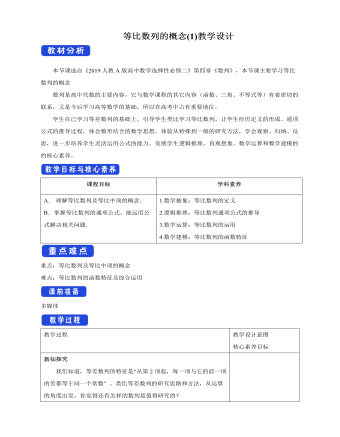
人教版高中数学选择性必修二等比数列的概念 (1) 教学设计
新知探究我们知道,等差数列的特征是“从第2项起,每一项与它的前一项的差都等于同一个常数” 。类比等差数列的研究思路和方法,从运算的角度出发,你觉得还有怎样的数列是值得研究的?1.两河流域发掘的古巴比伦时期的泥版上记录了下面的数列:9,9^2,9^3,…,9^10; ①100,100^2,100^3,…,100^10; ②5,5^2,5^3,…,5^10. ③2.《庄子·天下》中提到:“一尺之锤,日取其半,万世不竭.”如果把“一尺之锤”的长度看成单位“1”,那么从第1天开始,每天得到的“锤”的长度依次是1/2,1/4,1/8,1/16,1/32,… ④3.在营养和生存空间没有限制的情况下,某种细菌每20 min 就通过分裂繁殖一代,那么一个这种细菌从第1次分裂开始,各次分裂产生的后代个数依次是2,4,8,16,32,64,… ⑤4.某人存入银行a元,存期为5年,年利率为 r ,那么按照复利,他5年内每年末得到的本利和分别是a(1+r),a〖(1+r)〗^2,a〖(1+r)〗^3,a〖(1+r)〗^4,a〖(1+r)〗^5 ⑥
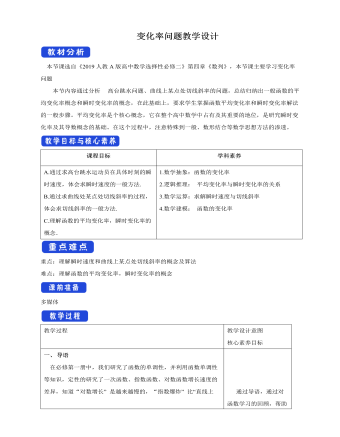
人教版高中数学选择性必修二变化率问题教学设计
导语在必修第一册中,我们研究了函数的单调性,并利用函数单调性等知识,定性的研究了一次函数、指数函数、对数函数增长速度的差异,知道“对数增长” 是越来越慢的,“指数爆炸” 比“直线上升” 快得多,进一步的能否精确定量的刻画变化速度的快慢呢,下面我们就来研究这个问题。新知探究问题1 高台跳水运动员的速度高台跳水运动中,运动员在运动过程中的重心相对于水面的高度h(单位:m)与起跳后的时间t(单位:s)存在函数关系h(t)=-4.9t2+4.8t+11.如何描述用运动员从起跳到入水的过程中运动的快慢程度呢?直觉告诉我们,运动员从起跳到入水的过程中,在上升阶段运动的越来越慢,在下降阶段运动的越来越快,我们可以把整个运动时间段分成许多小段,用运动员在每段时间内的平均速度v ?近似的描述它的运动状态。

人教版高中数学选择性必修二导数的概念及其几何意义教学设计
新知探究前面我们研究了两类变化率问题:一类是物理学中的问题,涉及平均速度和瞬时速度;另一类是几何学中的问题,涉及割线斜率和切线斜率。这两类问题来自不同的学科领域,但在解决问题时,都采用了由“平均变化率”逼近“瞬时变化率”的思想方法;问题的答案也是一样的表示形式。下面我们用上述思想方法研究更一般的问题。探究1: 对于函数y=f(x) ,设自变量x从x_0变化到x_0+ ?x ,相应地,函数值y就从f(x_0)变化到f(〖x+x〗_0) 。这时, x的变化量为?x,y的变化量为?y=f(x_0+?x)-f(x_0)我们把比值?y/?x,即?y/?x=(f(x_0+?x)-f(x_0)" " )/?x叫做函数从x_0到x_0+?x的平均变化率。1.导数的概念如果当Δx→0时,平均变化率ΔyΔx无限趋近于一个确定的值,即ΔyΔx有极限,则称y=f (x)在x=x0处____,并把这个________叫做y=f (x)在x=x0处的导数(也称为__________),记作f ′(x0)或________,即
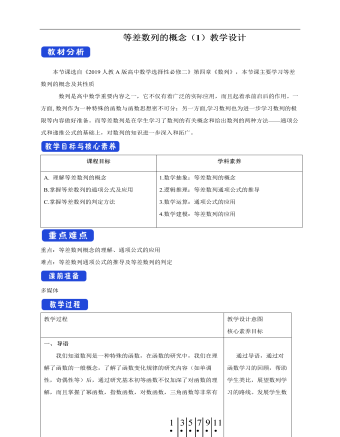
人教版高中数学选择性必修二等差数列的概念(1)教学设计
我们知道数列是一种特殊的函数,在函数的研究中,我们在理解了函数的一般概念,了解了函数变化规律的研究内容(如单调性,奇偶性等)后,通过研究基本初等函数不仅加深了对函数的理解,而且掌握了幂函数,指数函数,对数函数,三角函数等非常有用的函数模型。类似地,在了解了数列的一般概念后,我们要研究一些具有特殊变化规律的数列,建立它们的通项公式和前n项和公式,并应用它们解决实际问题和数学问题,从中感受数学模型的现实意义与应用,下面,我们从一类取值规律比较简单的数列入手。新知探究1.北京天坛圜丘坛,的地面有十板布置,最中间是圆形的天心石,围绕天心石的是9圈扇环形的石板,从内到外各圈的示板数依次为9,18,27,36,45,54,63,72,81 ①2.S,M,L,XL,XXL,XXXL型号的女装上对应的尺码分别是38,40,42,44,46,48 ②3.测量某地垂直地面方向上海拔500米以下的大气温度,得到从距离地面20米起每升高100米处的大气温度(单位℃)依次为25,24,23,22,21 ③
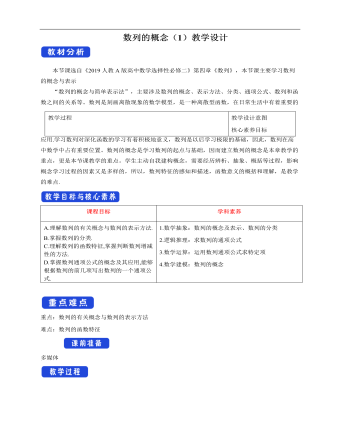
人教版高中数学选择性必修二数列的概念(1)教学设计
情景导学古语云:“勤学如春起之苗,不见其增,日有所长”如果对“春起之苗”每日用精密仪器度量,则每日的高度值按日期排在一起,可组成一个数列. 那么什么叫数列呢?二、问题探究1. 王芳从一岁到17岁,每年生日那天测量身高,将这些身高数据(单位:厘米)依次排成一列数:75,87,96,103,110,116,120,128,138,145,153,158,160,162,163,165,168 ①记王芳第i岁的身高为 h_i ,那么h_1=75 , h_2=87, 〖"…" ,h〗_17=168.我们发现h_i中的i反映了身高按岁数从1到17的顺序排列时的确定位置,即h_1=75 是排在第1位的数,h_2=87是排在第2位的数〖"…" ,h〗_17 =168是排在第17位的数,它们之间不能交换位置,所以①具有确定顺序的一列数。2. 在两河流域发掘的一块泥板(编号K90,约生产于公元前7世纪)上,有一列依次表示一个月中从第1天到第15天,每天月亮可见部分的数:5,10,20,40,80,96,112,128,144,160,176,192,208,224,240. ②
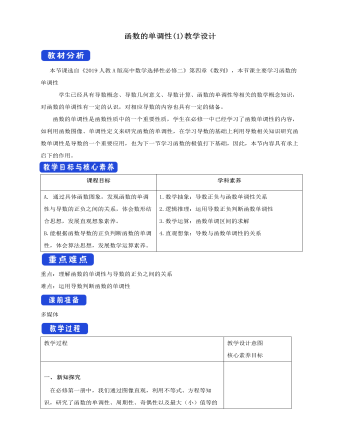
人教版高中数学选择性必修二函数的单调性(1) 教学设计
1.判断正误(正确的打“√”,错误的打“×”)(1)函数f (x)在区间(a,b)上都有f ′(x)<0,则函数f (x)在这个区间上单调递减. ( )(2)函数在某一点的导数越大,函数在该点处的切线越“陡峭”. ( )(3)函数在某个区间上变化越快,函数在这个区间上导数的绝对值越大.( )(4)判断函数单调性时,在区间内的个别点f ′(x)=0,不影响函数在此区间的单调性.( )[解析] (1)√ 函数f (x)在区间(a,b)上都有f ′(x)<0,所以函数f (x)在这个区间上单调递减,故正确.(2)× 切线的“陡峭”程度与|f ′(x)|的大小有关,故错误.(3)√ 函数在某个区间上变化的快慢,和函数导数的绝对值大小一致.(4)√ 若f ′(x)≥0(≤0),则函数f (x)在区间内单调递增(减),故f ′(x)=0不影响函数单调性.[答案] (1)√ (2)× (3)√ (4)√例1. 利用导数判断下列函数的单调性:(1)f(x)=x^3+3x; (2) f(x)=sinx-x,x∈(0,π); (3)f(x)=(x-1)/x解: (1) 因为f(x)=x^3+3x, 所以f^' (x)=〖3x〗^2+3=3(x^2+1)>0所以f(x)=x^3+3x ,函数在R上单调递增,如图(1)所示
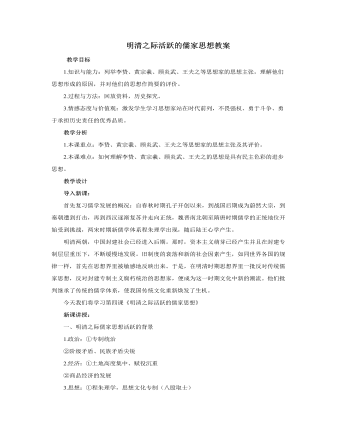
人教版高中历史必修3明清之际活跃的儒家思想教案
②顾炎武也激烈反对君主专制, 主张限制君权,提出亡国与亡天下的区别,认为,保卫一家一姓的国家,是君主及其大臣的事,而保卫天下是所有人的事,这段话后来被后人提炼为“天下兴亡,匹 夫有责”,鼓励人民关心国家大事。③王夫之认为天下的土地不能被君主一人所有,而应当是从事农业的老百姓都有份。2.经济上,重视手工业、商业的发展,强调经世致用。①黄宗羲驳斥轻视工商业的传统思想,指出工商业和农业一样,都是“民生之本”,应该受到保护。②顾炎武、王夫之主张文人多研究一些有关国计民生的现实问题,反对空谈。3.思想上,批判继承传统儒学,构筑具有时代特色的新思想体系。①黄宗羲批判旧儒学的“君为臣纲”的思想,继承先秦儒家的民本思想,提出 “天下为主,君为客”的新思想命题。
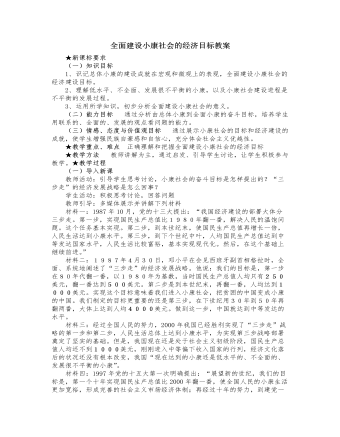
人教版高中政治必修1全面建设小康社会的经济目标教案
3、城镇人口的比重大幅度提高,工农差别、城乡差别、地区差别扩大的趋势逐步扭转请同学们阅读下面材料,结合刚才列举的实例,思考它说明什么问题?2000年我国农村小康总体实现程度在93%左右,城乡收入差距在3:1以上。1999年西部地区小康实现程度为84.18%,中部和东部地区为93.18%、97.86%,人均GDP最高的上海市突破4000美元,最低的贵州省只有300多美元。4、社会保障体系比较健全,社会就业比较充分,家庭财产普遍提高,人民过上更加富足的生活教师活动:请同学们阅读教材102页虚框内材料,思考所提问题学生活动:积极思考,讨论发言。教师总结:说明我国的社会保障体系逐步完善,但是城镇居民保障水平较高,农村社会保障水平还比较低。这与我国的国情是不相适应的,因此,本世纪初20年,要不断健全、完善社会保障体系,集中力量发展经济,降低失业率,提高城乡居民文化教育娱乐等消费比例,让人民的吃穿住行达到更高水平的小康。三、小康社会的建设特点和要求
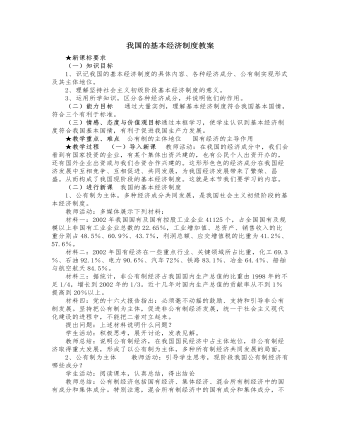
人教版高中政治必修1我国的基本经济制度教案
(3)外资经济 教师活动:外资经济是指外国投资者和港澳台投资者根据我国法律法规,在我国大陆设立的独资企业以及中外合资企业、中外合作企业中的外商投资部分。他有利于引进外资和先进技术,学习境外先进管理经验,有利于扩大就业、扩大出口,增加财政收入。 提醒学生注意中外合资企业、中外合作企业中的外商投资部分,不是指中外合资企业、中外合作企业全部资产。并简略介绍中外合资企业与中外合作企业的区别。(4)非公有制经济的地位 是社会主义市场经济的重要组成部分。教师点拨:请同学们注意比较,非公有制经济的地位与前面集体经济的地位有什么不同?学生活动:积极思考,回答问题教师点拨:集体经济的地位,是社会主义公有制经济的重要组成部分。社会主义公有制经济与社会主义市场经济这两个说法是不同的。(简单了解即可)4、为什么坚持以公有制为主体,多种所有制经济共同发展
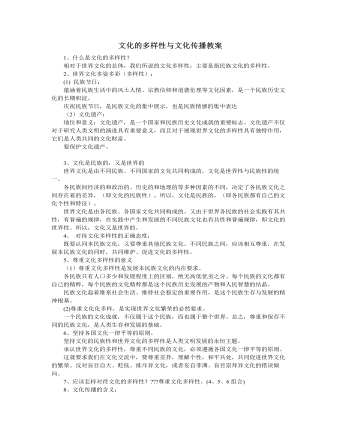
人教版高中政治必修3文化的多样性与文化传播教案
8、文化传播的含义:文化交流的过程,就是文化传播的过程。 人们通过一定的方式传递知识、信息、观念、情感和信仰,以及与此相关的所有社会交往活动,都可视为文化传播。9、文化传播的途径(1)商业活动。商人进行贸易活动时,不仅通过商品交换将商品中蕴涵的丰富文化加以交流,而且通过人与人之间的交往过程交流文化。(2)人口迁徙。每一次大规模的人口迁徙,都意味着大规模的文化传播,都会对当时当地的经济、政治、文化产生极大的影响。(3)教育教育是文化传播的又一重要途径。人们通过学习各种文化课程,能够获得不同的文化知识。文化传播是教育的重要功能。10、大众传媒:现代文化传播的手段现代社会中的传媒有报刊、广播、电视、网络等多种形式,这类传媒被称为大众传媒。依托现代信息技术,大众传媒能够最大程度地超越时空的局限,汇集来自世界各地的信息,日益显示出文化传递、沟通、共享的强大功能,已成为文化传播的主要手段。

新人教版高中英语必修3Unit 3 Diverse Cultures-Reading and Thinking教学设计
Discuss these questions in groups.Q1: Have you ever been to a place that has a diverse culture ? What do you think about the culture diversity ?One culturally diverse place that I have been to is Harbin, the capital city of Heilongjiang Province. I went there last year with my family to see the Ice and Snow Festival, and I was amazed at how the culture as different to most other Chinese cities. There is a big Russian influence there, with beautiful Russian architecture and lots of interesting restaurants. I learnt that Harbin is called “the Oriental Moscow” and that many Russians settled there to help build the railway over 100 years ago.Q2: What are the benefits and challenges of cultural diversity ?The benefits: People are able to experience a wide variety of cultures, making their lives more interesting, and it can deepen the feelings for our national culture, it is also helpful for us to learn about other outstanding culture, which helps improve the ability to respect others. The challenges: People may have trouble communicating or understanding each other, and it may lead to disappearance of some civilizations and even make some people think “The western moon is rounder than his own.”Step 7 Post reading---RetellComplete the passage according to the text.Today, I arrived back in San Francisco, and it feels good (1) _____(be) back in the city again. The city succeeded in (2)_________ (rebuild) itself after the earthquake that (3)________ (occur) in 1906, and I stayed in the Mission District, enjoying some delicious noodles mixed with cultures. In the afternoon, I headed to a local museum (4)____ showed the historical changes in California. During the gold rush, many Chinese arrived, and some opened up shops and restaurants in Chinatown to earn a (5)_____ (live). Many others worked on (6)______ (farm), joined the gold rush, or went to build the railway that connected California to the east. The museum showed us (7)____ America was built by immigrants from (8)________ (difference) countries and cultures. In the evening, I went to Chinatown, and ate in a Cantonese restaurant that served food on (9)________(beauty) china plates. Tomorrow evening, I’m going to (10)__ jazz bar in the Richmond District. 答案:1. to be 2. rebuilding 3. occurred 4. that 5.living6. farms 7.how 8. different 9. beautiful 10. a

新人教版高中英语必修3Unit 5 The Value of Money-Discovering Useful Structures导学案
4.They were going to find someone to take part in their bet when they saw Henry walking on the street outside.[归纳]1.过去将来时的基本构成和用法过去将来时由“would+动词原形”构成,主要表示从过去某一时间来看将要发生的动作(尤其用于宾语从句中),还可以表示过去的动作习惯或倾向。Jeff knew he would be tired the next day.He promised that he would not open the letter until 2 o'clock.She said that she wouldn't do that again.2.表示过去将来时的其他表达法(1)was/were going to+动词原形:该结构有两个主要用法,一是表示过去的打算,二是表示在过去看来有迹象表明将要发生某事。I thought it was going to rain.(2)was/were to+动词原形:主要表示过去按计划或安排要做的事情。She said she was to get married next month.(3)was/were about to+动词原形:表示在过去看来即将要发生的动作,由于本身已含有“即将”的意味,所以不再与表示具体的将来时间状语连用。I was about to go to bed when the phone rang.(4)was/were+现在分词:表示在过去看来即将发生的动作,通常可用于该结构中的动词是come,go,leave,arrive,begin,start,stop,close,open,die,join,borrow,buy等瞬间动词。Jack said he was leaving tomorrow.